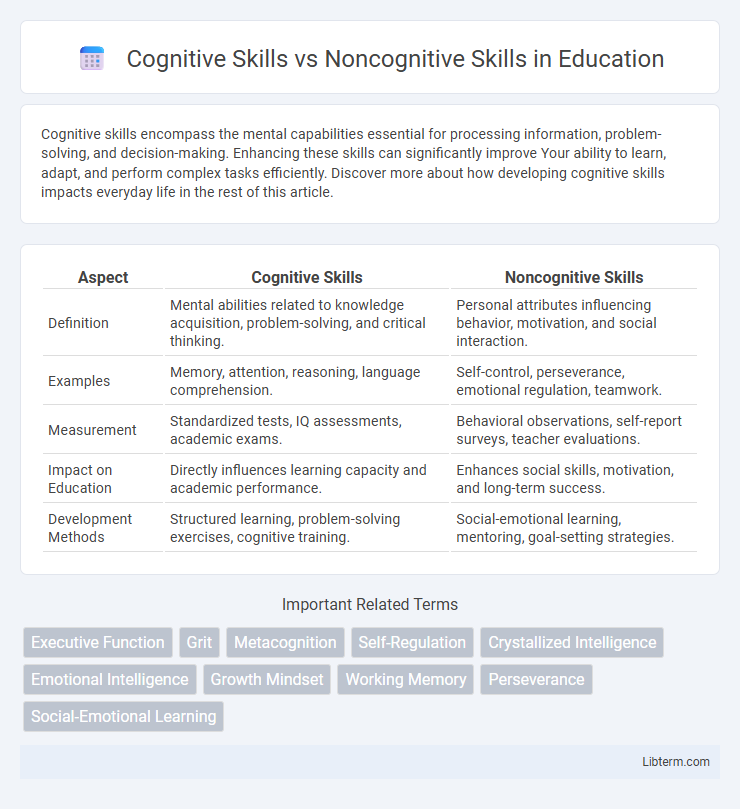Cognitive skills encompass the mental capabilities essential for processing information, problem-solving, and decision-making. Enhancing these skills can significantly improve Your ability to learn, adapt, and perform complex tasks efficiently. Discover more about how developing cognitive skills impacts everyday life in the rest of this article.
Table of Comparison
| Aspect | Cognitive Skills | Noncognitive Skills |
|---|---|---|
| Definition | Mental abilities related to knowledge acquisition, problem-solving, and critical thinking. | Personal attributes influencing behavior, motivation, and social interaction. |
| Examples | Memory, attention, reasoning, language comprehension. | Self-control, perseverance, emotional regulation, teamwork. |
| Measurement | Standardized tests, IQ assessments, academic exams. | Behavioral observations, self-report surveys, teacher evaluations. |
| Impact on Education | Directly influences learning capacity and academic performance. | Enhances social skills, motivation, and long-term success. |
| Development Methods | Structured learning, problem-solving exercises, cognitive training. | Social-emotional learning, mentoring, goal-setting strategies. |
Introduction to Cognitive and Noncognitive Skills
Cognitive skills encompass mental capabilities such as memory, attention, problem-solving, and critical thinking, which are essential for processing information and learning. Noncognitive skills include personality traits, motivation, perseverance, and social abilities that influence behavior, attitude, and emotional regulation. Understanding the distinction between cognitive and noncognitive skills is crucial for educational development, as both types contribute uniquely to academic success and personal growth.
Defining Cognitive Skills
Cognitive skills refer to the core mental capabilities involved in acquiring knowledge and understanding through thought, experience, and the senses, including processes like memory, attention, problem-solving, and reasoning. These skills enable individuals to process information effectively, analyze complex concepts, and execute decision-making tasks. Unlike noncognitive skills, which encompass emotional and social competencies, cognitive skills are central to academic performance and intellectual development.
Understanding Noncognitive Skills
Noncognitive skills encompass traits such as emotional regulation, persistence, and social abilities that influence behavior and decision-making beyond intellectual capacity. These skills play a crucial role in academic achievement, career success, and overall well-being by shaping motivation, self-control, and interpersonal interactions. Research demonstrates that strengthening noncognitive skills can enhance resilience and adaptability in dynamic environments.
Key Differences Between Cognitive and Noncognitive Skills
Cognitive skills encompass mental abilities such as memory, attention, problem-solving, and logical reasoning, which are essential for academic achievement and intellectual tasks. Noncognitive skills include traits like emotional regulation, motivation, perseverance, and social skills, which influence behavior, attitude, and interpersonal interactions. The key difference lies in cognitive skills being measurable intellectual processes, while noncognitive skills relate to personality characteristics and emotional intelligence that impact long-term success beyond academics.
The Role of Cognitive Skills in Academic Success
Cognitive skills such as critical thinking, problem-solving, and memory play a crucial role in academic success by enhancing students' ability to process information, comprehend complex concepts, and apply knowledge effectively. These mental capabilities facilitate higher-order learning and enable learners to adapt to challenging academic tasks, leading to improved performance and achievement. Research consistently highlights the positive correlation between strong cognitive skills and higher standardized test scores, graduation rates, and college readiness.
Importance of Noncognitive Skills in Personal Development
Noncognitive skills such as emotional regulation, resilience, and interpersonal communication play a crucial role in personal development by enhancing an individual's ability to navigate social environments and manage stress effectively. These skills contribute significantly to long-term success and well-being, often predicting life outcomes beyond academic achievement. Developing noncognitive skills fosters adaptability and self-motivation, which are essential for continuous growth and career advancement in dynamic settings.
Measuring and Assessing Both Skill Sets
Measuring cognitive skills involves standardized tests that evaluate memory, reasoning, and problem-solving abilities, such as IQ tests and academic assessments. Noncognitive skills, including emotional regulation, motivation, and social interaction, are assessed through behavioral observations, self-report questionnaires, and situational judgment tests. Combining quantitative data from cognitive evaluations with qualitative insights from noncognitive assessments provides a comprehensive understanding of individual capabilities.
Cognitive vs Noncognitive Skills in the Workplace
Cognitive skills in the workplace encompass abilities like critical thinking, problem-solving, and analytical reasoning, which drive effective decision-making and task execution. Noncognitive skills include emotional intelligence, communication, teamwork, and adaptability, essential for collaboration and managing interpersonal relationships. Both skill sets are vital for employee performance, with cognitive skills addressing technical challenges and noncognitive skills fostering a productive work environment.
Integrating Both Skills in Education Systems
Integrating cognitive skills, such as critical thinking and problem-solving, with noncognitive skills like emotional intelligence and perseverance enhances student outcomes and lifelong success. Education systems that adopt a holistic approach, incorporating social-emotional learning programs and collaborative learning environments, foster both intellectual growth and character development. Data from longitudinal studies indicate that balanced skill development improves academic achievement, career readiness, and overall well-being.
Enhancing Cognitive and Noncognitive Skills for Lifelong Growth
Enhancing cognitive skills such as critical thinking, problem-solving, and memory is essential for academic achievement and professional success. Noncognitive skills, including emotional regulation, perseverance, and social interaction, significantly contribute to adaptability and interpersonal relationships throughout life. Integrating targeted training programs in education and workplace environments fosters lifelong growth by developing both cognitive and noncognitive competencies.
Cognitive Skills Infographic

 libterm.com
libterm.com